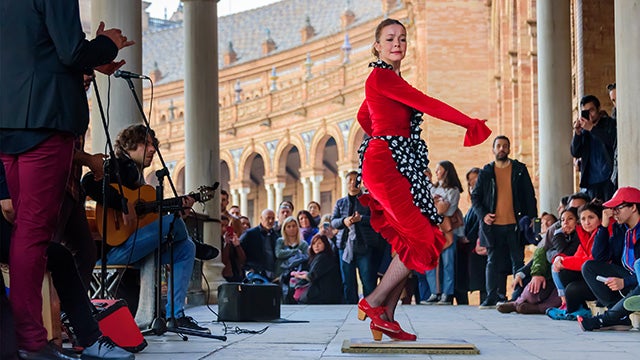Sarah Silverblatt-Buser is a special projects associate with the Aspen Institute Arts Program. Below, she describes her experience as a study abroad student in Havana, Cuba, and the complexities of being a foreigner with more power than imagined.
Aprovechar was one of the first words our group of 12 American study abroad students discussed while anxiously anticipating our 4 a.m. wakeup for the next day’s 45-minute flight to Havana, Cuba. “To take advantage, to make use of, to harness” are direct translations of a multipurpose verb that means much more in a country slowly suffocated by a messy 54-year embargo (or “blockade” as it’s still called in Cuba).
As with most translations, these don’t quite do it justice. “To be of use” might come closer. It seems less imposing, less transactional, more generous. Even still, without the nuances of context, our naively American, result-driven tendencies compelled us to understand aprovechar as primarily individualistic. We were going to Cuba to take advantage of this special opportunity, to make the most of a fleeting four-month “experience.”
My first month in Cuba was, as most visitors experience, a series of realizations of reality. In addition to my academic courses at la Universidad de la Habana, I attempted to take an Afro-Cuban dance class at el Instituto Superior de Arte (ISA). A confiscated country club, the prestigious art school receives students from throughout the world, and provides free education for aspiring Cuban artists — what a dream! Free arts education! I was finally going to live in a place that truly validated my passion. But, like many things in Cuba, my foreign fantasy turned out to be a bit more complex than I’d imagined.
Dance is my thing. It’s what gives me life and a lens to see the world. Like the transience of aprovechar, dance takes on a different shape and meaning depending on the setting. But unlike our original, individualisitc understanding of the verb, there’s almost always more to be gained by the whole than its parts.
Dance exists beyond ownership. It is a process of simultaneous destruction and creation that can become familiar in even the most foreign circumstances. I was drawn to Cuba by the fantasy of a society that celebrated and structurally supported such a process of expression. What would it be like to live in a country whose national hero, the “Apostle of Cuban Independence,” is a poet, Jose Marti? Or where art and culture are meant to engage citizens in responsible participation, through the “expression of one’s own human condition,” as Che Guevara asserted in his immortalized essay, “Socialism and Man in Cuba?” Were people really always dancing and singing in the streets?
My idealization of an artful society was abruptly confronted when, after a few weeks of intense classes, my professor stopped showing up. I was confused and frustrated. How could I lose so much precious time that should have been taken advantage of some other way? The privilege in my impatience became apparent when my Cuban peers didn’t seem so surprised by her absence. It was likely, a new Cuban friend explained with a shrug, that our professor was elsewhere teaching private classes to foreigners, where she could make significantly more money than the state salary she earned at ISA, and it was entirely her prerogative.
It’s true that artists are revered in Cuba. For their talent, but also because of the social capital they gain from interacting with outsiders. Unlike most Cubans, artists have the ability to travel off the island. If they don’t defect, like many do, they can at least return with cash and an alternative perspective. With limited material resources to provide opportunity for wealth, it makes sense that invisible assets like culture capital are utilized to accumulate actual hard currency. And with Western businesses recognizing that experiences sell better than products, Cuba is the juiciest forbidden fruit, ripe for cultural cherry picking.
The recent normalizing of relations between Cuba and the US creates a host of complicated contradictions. Cuba has been slowly transitioning towards private enterprise since the collapse of the Soviet Union, of its own accord. Nevertheless, most Americans I talk with can’t help but look at me and sigh, “Wow, you’re so lucky you were there before we change it all.” Typical of American presumption, such a statement ignores the agency of the Cuban people and government in the process of negotiation.
Aspects of life in Cuba remain severely dated, absolutely, but Cuba has advanced itself in impressive ways — such as a lower infant mortality rate than the US and a 99.8 percent literacy rate — especially considering the economic restrictions it has endured. Even so, many Cubans I met were anxious for change, hoping to keep a socialist sense of solidarity while advancing private enterprise to secure more personal capital.
People do what they need to do to survive. My professor made the most of her situation to the detriment of the Cuban students. I’m sure the foreigners in the private class enjoyed themselves and learned a lot, but I’m also sure they didn’t realize what power they unknowingly held over the Cuban students. I was grateful to my local classmates for later introducing me to the técnica cubana classes held at el Teatro Nacional. With patience, the community that became my sustenance was revealed to me through a shared love of movement and music, more than a blatant desire for experience. And yet, two years later, I’m still discovering the repercussions of coming and leaving.
We all live navigating our own contradictions. My hope for the coming thaw is that we as Americans tread lightly and thoughtfully: that we help only when it is asked, that we question ourselves, and that we may arrive at an understanding of aprovechar as an action of collective achievement, aware of our power.
